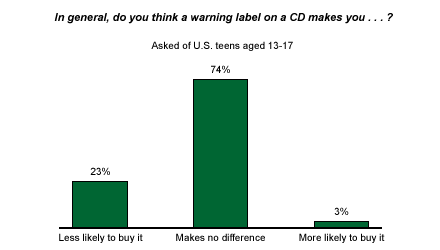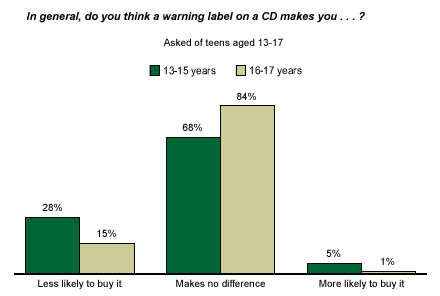Since 1985, record companies and artists have voluntarily adhered parental advisory labels to albums with lyrics they determine to be too violent or too sexy for young listeners. The labels are designed to offer parents some guidance when deciding whether albums are appropriate for their children, but do teens heed the warnings?
In a recent Gallup Youth Survey*, the vast majority of teens, 74%, said warning labels on CDs do not affect their purchase decisions either way. "I don't really know anyone who cares about warning labels," says Mitch, a 17-year-old respondent from Oregon. The good news for parents may be that only 3% of teen respondents said the warning label makes them more likely to buy the music CD, and 23% said that a label makes them less likely to buy the CD.

Maturation and Mature Content
Poll data suggest younger teens are slightly less inclined than older teens to buy a CD with a warning label: 28% of respondents aged 13 to 15 said they would be less likely to buy a CD with a warning label, whereas only 15% of 16- and 17-year-olds said so. Older teens are more likely than younger teens to say labels make no difference, 84% compared with 68%, which makes sense because older teens' parents may give them more freedom to choose their own music.

Rebecca, a 14-year-old respondent from Maryland, says she and her friends would be less likely to purchase a CD with a warning label. "A lot of people I know pay attention to the labels and don't buy CDs that have them," she says. "My parents have taught me not to listen to songs with bad words, and I don't."
Influence of Politics and Religion
Political party affiliation and religiosity may also affect whether teens purchase CDs with warning labels. Thirty-five percent of teens who plan to vote Republican when they are old enough say they would be less likely to buy a CD with a warning label, compared with 13% of future Democrats. A similar trend is seen according to church attendance, but party affiliation and religiosity are related among teens.
"My friends don't really care about warning labels, but I know parents who might care. Their morals are a bit different than my parents' or friends' parents though -- they're more conservative on a political level," Mitch says. "But, I have friends whose parents are pretty religious and their parents don't care."
Bottom Line
The music industry self-regulates when it comes to deciding which albums need parental advisory labels. So, even if parents are hyper-aware of these warnings, there is a chance that explicit content could appear in albums without warning labels. But parents may take comfort in this statement from the Recording Industry Association of America report: "It's not the labels kids look for, it's the music. Independent research shows kids put limited weight on lyrics in deciding which music they like, caring more about rhythm and melody. The warning label alone isn't enough incentive." Rebecca tends to agree: "I listen to a lot of popular songs, and it's the music that makes it popular, not the lyrics."
*These results are based on mail and Web surveys with a randomly selected national sample of 549 teenagers in the Gallup Poll Panel of households, aged 13 to 17, conducted April 15 to May 22, 2005. For results based on this sample, one can say with 95% confidence that the maximum error attributable to sampling and other random effects is ±5 percentage points. In addition to sampling error, question wording and practical difficulties in conducting surveys can introduce error or bias into the findings of public opinion polls.